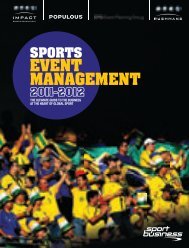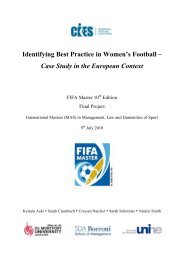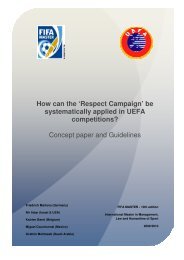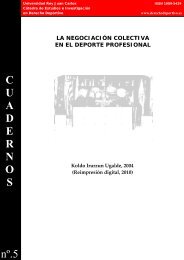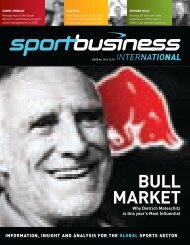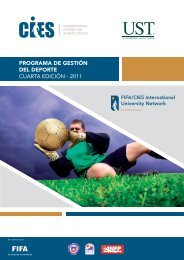Sports Marketing & Sponsorship - FIFA/CIES International University ...
Sports Marketing & Sponsorship - FIFA/CIES International University ...
Sports Marketing & Sponsorship - FIFA/CIES International University ...
- No tags were found...
You also want an ePaper? Increase the reach of your titles
YUMPU automatically turns print PDFs into web optimized ePapers that Google loves.
European football under close scrutinyRESEARCH PAPERfor social and moral equity, and in the desire forhonesty and justice. A beneficial combination ofphilosophy and morals could then give rise to abusiness ethics dominated by integrity, and sports ingeneral would not be exempt. Football in particular,because of the huge amounts of money involved andits intense media exposure, often experiences thesepressures.Since its creation, football has always portrayedcertain fundamental values such as courage,determination, performance, respect for rules and forothers, exceeding one’s limits, and the “beauty” oftrack and field. Moreover, sport has a symbolicfunction in that it is a reminder that sport is, above all,the activity of individuals who are members of asociety. In terms of social responsibility, sportembodies an ideal. As the flagship of an egalitariansociety, it should be the emblematic example forethical conduct. The sporting market is huge, andinternational brands convey images that combineyouth with the idea of a cosmopolitan andmulticultural society. The importance of such athought is demonstrated and exemplified byNahapetian (2004).Ethics used as a strategy: a deliberate choiceor a forced decision?As a rule, the responsibility of today’s organisations isthree-fold: a social responsibility to their employeesand consumers; a societal responsibility to thecommunity in which they operate; and anenvironmental responsibility in the broad sense of theterm (Caroll, 1979; Beji-Becheur & Bensebaa, 2004).Given this triple responsibility, our study concerns theincorporation and the application of ethics in thestrategies of these organisations. Furthermore,organisations that coordinate sporting events arehighly specialised and require a particularly focusedstudy, since this market is characterised by a specificethical claim, emphasised to the point of assertingthat these activities are the “sporting exception”.How can profit be reconciled with a respect for“what is right and good” from economic, social,societal and environmental points of view? Ethicalproblems also emerge when two duties conflict; forexample, the duty to ensure the continuing financialhealth of a capitalist enterprise and the duty to protectthe interests of society (Morin, 2004). This isundoubtedly the most acute issue. In combining ethicswith sport, football organisations find themselvesahead in the implementation of higher levels offunctioning, and could be seen as ideal examples fornon-sporting organisations. We can better illustratethis with the following examples. In 2006, the SeppBlatter Foundation Prize was awarded to the HandicapSport Association. This foundation aims to supportsporting projects, particularly in football. In the sameway, the Football Foundation, funded by the FootballAssociation and the British government, is one of thelargest sporting and social associations in the UK.These foundations are playing a key role in revitalisinggrass roots sport. Their main mission concerns socialdevelopment through the establishment andcommunication of the values traditionally associatedwith English football.Although once committed to satisfying theirshareholders, these organisations are today required tomeet the demands of their stakeholders, whether theybelong to these organisations (owners, managers,employees, volunteers) or not (competitors, fans,governments, lobbies, the media, community andnatural environment) (Mercier, 2001; Madsen & Ulhoi,2001; Gabriel, 2003) 1 . The report ‘Football and itscommunities’, carried out by Manchester Metropolitan<strong>University</strong> over three years, outlines a new vision andunderstanding of how the football world can engagewith communities. It recognises the extensive effortsthat football, more than any other sport, has put intocommunity development. This stakeholder theory is theframework of much of today’s research onorganisational ethics (Caroll, 1979, 1999; Mercier,2001). This paper focuses on the normative dimension1 Maignan & Swaen (2004, p.55): “Stakeholders refer to individuals or groups who – directly or indirectly – influence the operations of the company orcan be influenced by them (suppliers, customers, employees, investors, local communities, governments, lobbies, trade associations, etc.)”.234 <strong>International</strong> Journal of <strong>Sports</strong> <strong>Marketing</strong> & <strong>Sponsorship</strong> ● APRIL 2009 ●






